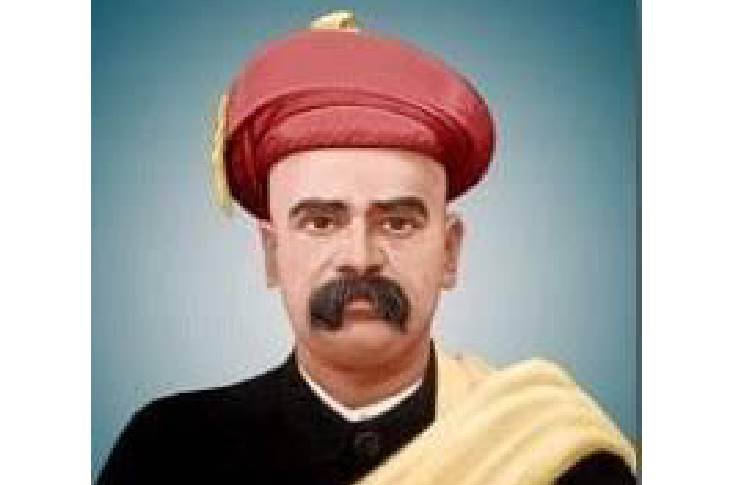Agarkar’s commentaries may be carrying a tinge of the ‘enlightened despotism’ that was the characteristic of philosophical radicals, but his works are still very useful to understand his diligence to expose common people to liberal-individualistic ideas.
Agarkar is most frequently remembered as a ‘friend-turned-opponent’ of Tilak. In Maharashtrian popular culture, Agarkar perhaps got this hyphenated identity that was seldom devoid of a reference to Tilak. I too got acquainted with Gopal Ganesh Agarkar through Tilak. Agarkar was an equal of Tilak in terms of his love for the land and intellectual prowess. Tilak’s meteoric rise as a national leader was owing to his appealing and aggressive rhetoric. He had to tone it down as he widened his world-view after becoming a national leader. But Agarkar, his prison-mate of one time who later became a compeer, maintained his moderate and liberal positions all along.
Agarkar is commemorated for his work as a social reformer, as a rationalist and as an educationist. However, it is safe to say that even after 125 years of his demise, academicians failed to objectively understand and recognise his positions on many issues especially the ones on economics. He often wrote essays commenting on the nature of discourse on economics prevalent during his time. His essays are of particular significance to understand where exactly he stood as a 19th -century liberal and to comprehend the philosophical influences that propelled him to take those positions. The two essays that reveal his economic thoughts are titled ‘Teen Arthashastre’ – which can be broadly translated as ‘Three Strands of Economics’.
He opens his first essay with the analogy of an ongoing ‘Tug of war’ between what he called the extremely ignorant people of India on one hand and an extremely self-serving British government in India. And the liberal-intellectuals in the society were dismayed by the self-serving policy initiatives of the British government and equally by the lack of logic in Indian demands for economic redressal. As a member of the third party of intellectuals, not aligning with the views of the government or the vast majority of Indian nationals, he advanced suggestions for both the government and the people of India.
Economics is about production, distribution and transactions or exchanges. India had a grave problem concerning all three aspects. India’s production was diminutive and thus the wealth produced was limited. Therefore, the other two factors of a healthy economy were also impaired. This was a result of the foreign rule in India. Agarkar categorized the then-existing views on economics under three labels. These can be broadly called Axiomatic or Classical Economics, Practical Economics and Illusory Economics. We shall discuss the three categories of the then prevalent thought in the same sequence as Agarkar did.
As per the tenets of Classical Economics, a government should stay away from interfering in production, distribution and trade in general. However, the British government in India used this very principle of non-intervention to ignore the grave economic conditions and to turn a blind eye toward the debilitating effects of its economic policies. It was obvious to Agarkar that the government chose to be brazenly opportune and abide by this principle where it helped serve the British national interest and it blatantly violated the same principle when it was not beneficial for its national interest.
Given the complex political relationship between the British government of India and the Indian people, the conventional rules of economics wouldn’t apply to the Indian conditions. According to Agarkar political freedom and economic freedom were inextricably intertwined and he was convinced that Indians would have to win them back in the same sequence in which they lost those to the British. He further argued that the British held India as a precious possession not because they cared for India or her people, but because India was geographically important in continuing the trade with other Asian countries. The colonial masters valued India for the access it granted to Britain to the distant parts of the orient. The trade via India benefited the British more than their occupation of Indian possessions and the Indian resources.
Agarkar pointed out that India never had a consumerist culture. Wantonly enjoying different goods and services was yet to be deemed normal. This was one of the reasons why Indians never developed the skills, talents and means required to produce goods. Ironically, Indians had to depend on the British even for the essentials that could be easily and cost-effectively produced in India. This led to the infamous economic drain and rendered the nation vulnerable to rustification.
This begs a question that if the economic ordeal was real and so overt, then how did the government manage to govern India for decades after the first spark of consciousness among the Indian intellectuals? The answer lies in the fact that the government mastered the art of controlling the impoverished masses by offering temporary relief in various ways. At times the government appointed a commission when the popular discontent was too conspicuous. On some other occasions, it offered some concessions to the farmers. Yet another time it dug canals and wells, distributed seeds of cotton or wheat, established farms to carry out experiments or even established veterinary hospitals. Apart from these usual methods, Agarkar touched upon two more ways in which the government used its power supposedly for the redressal of grievances. One, the government at times sought to save the peasants by inflicting costs on the landlords – by pitting the classes against each other. Secondly, the government opened up a ministry to manage agrarian affairs and manned it with intelligent bureaucrats. They had a lucrative remuneration for which Indians paid through their tax money. The government did all of this in the name of ‘agrarian reforms’ but none of the so-called reforms elevated the lifestyle of crores of poor Indians fundamentally.
As Agarkar put it “the fatal and deep wound of systemic impoverishment (that the economic policies of the government) inflicted on Indians could not be healed by mere band-aids.” No amount of temporary relief could improve the economic condition of India. If India had to recover and reinvigorate herself, it would take some serious effort – a reliable ‘tonic’. Increasing the volume of the production (and subsequently trade) was the only suitable tonic that could impart vitality among Indians. He argued that countries like France, the United States of America, Germany, Italy, Russia, Japan, Switzerland and even England worked toward increasing the trade when their industries were at a nascent stage. But, when this historical fact was brought to the notice the British officials would respond frantically as if the laws of classical economics had always been sacrosanct for them. “Indian thinkers like Justice Telang, Justice Ranade and Dadabhai Naoroji had devised ways of stimulating Indian industries, commerce and agriculture without violating the laws of economics. But to what end?” Agarkar didn’t hide his pessimism about the British nonchalance when he declared that these sane voices were falling on deaf ears. “Afterall one can be woken up from slumber if they are asleep, how can a person who pretends to be asleep be woken up?” – questioned Agarkar.
Given the nature of British rule, Agarkar concluded that the general laws of classical economics were not entirely suitable for the then prevailing conditions. His explanation for deviating from classical thought was that the principles of classical economics cannot be applied to every society as their applicability hinges upon the level of economic development in a given society. Typically the new colonies or underdeveloped countries require some modifications.
‘If there are compelling reasons to believe that industry, if promoted, for the time being at least at the outset, can flourish and if it creates self-sustainable enterprises, it won’t require the support of the state then such an industry should be incentivized by the state.’ This state support would be purely temporary. This was the second and less prevalent view called Practical Economics. It was the one that Agarkar adhered to. However, this was his second-best and he considered it a transitional arrangement to reach the ideals of Classical Economics.
The Indian public intellectuals such as Agarkar and economists like Ranade demanded a specific, temporary and transient role for the state – one that of a facilitator for free trade and industry. But the British government naturally showed the proclivity to protect the British businesses from any emergent competition. More so, if it was coming from the natives. On the other hand, Agarkar was also concerned with how many Indians extolled the so-called virtues of Indian products. He ridiculed them as people with a ‘misplaced sense of patriotism’. He placed them in the third category of those who believed in Illusory Economics. Dismissing the false sense of being useful to the nation that one may derive by promoting Swadeshi, he declared that ‘no one has ever benefited from buying a costly product just because it is (swa)deshi’ or made in India.
Agarkar was convinced that both the British state and the Indian people had something in common. The extremely self-seeking character of the government and the naivety of the common people in India indeed had a point of concurrence – both the Indians and the British fell for protectionism of some sort. It clarifies that Agarkar wanted the state to create good conditions for industries to increase production, trade and commerce. He did not seek protection. His unequivocal rejection of the preferential treatment to products based on the place of their origin and opposition to state or society sponsored protection to businesses is testimony to his belief in fair play and competition.
A seasoned economist may find his methodology questionable because Agarkar was not an economist. He was still an educationist and editor who believed in liberty for all and all walks of life. Yet he had convictions much like the philosophical radicals in England. The influence of Mill on Agarkar is conspicuous. Agarkar’s commentaries may be carrying a tinge of the ‘enlightened despotism’ that was the characteristic of philosophical radicals, but his works are still very useful to understand his diligence to expose common people to liberal-individualistic ideas.


